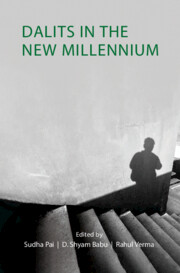Book contents
- Frontmatter
- Contents
- List of Figures
- List of Tables
- Acknowledgements
- 1 Introduction: Dalit Discourse in the New Millennium
- Part I Shifting Patterns of Electoral Politics
- Part II Popular Culture, Discourse, and Protest
- Part III Transformations in Ideology and Identity
- Part IV Aspirations and Anxieties
- 16 Technology in the Lives of Young Dalits
- 17 Dalit Middle Class: Aspirations, Networks, and Social Capital
- 18 The Persisting Developmental Gap: A Case for Restitution and Reparations
- 19 Dalit Capitalism: Adversity, Opportunity, and Agency
- Part V Discrimination and Representation
- About the Contributors
- Index
16 - Technology in the Lives of Young Dalits
from Part IV - Aspirations and Anxieties
Published online by Cambridge University Press: 12 July 2023
- Frontmatter
- Contents
- List of Figures
- List of Tables
- Acknowledgements
- 1 Introduction: Dalit Discourse in the New Millennium
- Part I Shifting Patterns of Electoral Politics
- Part II Popular Culture, Discourse, and Protest
- Part III Transformations in Ideology and Identity
- Part IV Aspirations and Anxieties
- 16 Technology in the Lives of Young Dalits
- 17 Dalit Middle Class: Aspirations, Networks, and Social Capital
- 18 The Persisting Developmental Gap: A Case for Restitution and Reparations
- 19 Dalit Capitalism: Adversity, Opportunity, and Agency
- Part V Discrimination and Representation
- About the Contributors
- Index
Summary
Ved Prakash, a young Dalit man from Bihar, had a postgraduate degree and a teaching job at a government-run school when he decided to study journalism. ‘I had been teaching for five years when I quit my job. I thought if I don't do this job, someone else [from my community] can do it. But we have no one in the media.’
So, he searched the internet for journalism colleges and came across the Indian Institute of Mass Communication, New Delhi. ‘I applied right away and cleared both the written test and interview,’ he said. He chose to study television journalism. In 2014, he got his first major job as a business reporter for the Dainik Bhaskar in Patna. ‘It was a good job. Mainly, I would receive business-related press releases and turn them into news reports.’
Some of those press releases came from Dalit organizations. ‘I was receiving a lot of news about Dalits.’ But he noticed that his articles were often missing from the next day's newspaper. The desk was killing them, he said. ‘If I asked them why they weren't publishing my articles day after day, they would say I shouldn't complain as long as I was being paid a salary.’
He was told to keep quiet and carry on. ‘Kranti nahin karni hai. Naukri karo’ (Don't start a revolution; do your job). So he quit. ‘My whole purpose was to highlight the voices of my people in the media.’
Upper castes have a stranglehold across print, television, and digital media. According to a 2019 Newslaundry–Oxfam study, as many as 106 of the 121 managerial positions in the surveyed newsrooms were held by upper-caste individuals; three out of every four anchors (among a total of 40 anchors on Hindi channels and 47 on English channels) of news debates were upper-caste; only 5 per cent of all articles in English newspapers were written by Dalits or Adivasis (Hindi newspapers scored slightly higher at around 10 per cent); and 72 per cent of by-lined articles on news websites were written by upper-caste journalists.
- Type
- Chapter
- Information
- Dalits in the New Millennium , pp. 285 - 301Publisher: Cambridge University PressPrint publication year: 2023



